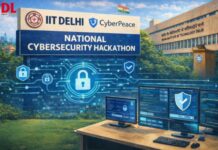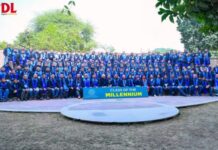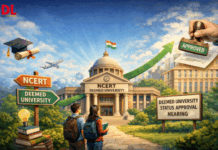Research has shown that if you study by hearing something you retain 20 per cent. If you see what you learn you retain 50 per cent. So what if you can see and hear what you learn? Retention becomes 70 per cent or more. This is more than enough to understand that ICTenabled education is the education of the future. Kerala believes in this. This is better proved with the recent inauguration of a ‘Smart Class’ in a Higher Secondary School in Thiruvananthapuram. As part of the innovative teaching method, a computer and four monitors each would be provided to all classes in the school.
Kerala is the most literate State in
 India. As per 2001 Census, the effective literacy rate was 90.92%. At present, there are 12271 Schools consists of 6712l L.P. Schools, 2951 U.P Schools and 2608 High Schools in the State. Of these, 4492 are Government Schools, 7282 are Private aided Schools and 497 are Private Unaided School
India. As per 2001 Census, the effective literacy rate was 90.92%. At present, there are 12271 Schools consists of 6712l L.P. Schools, 2951 U.P Schools and 2608 High Schools in the State. Of these, 4492 are Government Schools, 7282 are Private aided Schools and 497 are Private Unaided School
The teachers will display on the monitor the topics on which they are taking classes for helping the students to understand them clearly. So when a Geography teacher explains a lesson dealing with volcanoes, a visual of the exploding volcano and flowing larva would be displayed on the computer screen. As part of the scheme, the school has purchased 42 computers for all the 42 divisions from standard I to standard XII. The computer in each class will be connected to the server room named knowledge centre. The teachers should inform the knowledge centre the topics they intend to cover during a week. The belief goes firmer with the fact that the hardware for ICT-enabling secondary education was almost in place in the state, for programmes like IT@School and EDUSAT. The IT @ School Project has remodeled conventional teaching methodologies in classrooms through use of Information Technology. The project, in its first stage, is being implemented in 2,738 High Schools; over 40,000 teachers were given 90 hours of training on IT skills and computer labs with 10 to 60 omputersare available in all High Schools. The project is unique in that it is the schoolteacher than a techie who delivers lessons, both theory and practical, in classrooms. The Virtual Classroom Technology on EDUSAT for Rural Schools (VICTERS) programme is active to harness the satellite for teacher training programmes, providing highspeed net connectivity to schools and for implementing learning management solutions. In tune with the policy of the National Institute of Education Technology, SIET, Kerala, wasengaged in eveloping broadcastready educational content for students from standards eight to twelve. As of now, SIET had about 600 hours of broadcast-ready educational content. SIET has also readied a CD-kit containing 150 video CDs as part of the CD library project of the Education Department. These CDs contain documentaries based on the syllabus of standard 10 in the State’s schools. SIET is also awaiting the final approval for its Rs.138-crore ‘ICT@School’ project submitted to the Centre. This project, if cleared, would ICT-enable learning and
teaching in all Government schools in the State within five years.
























